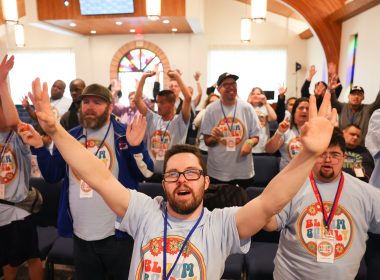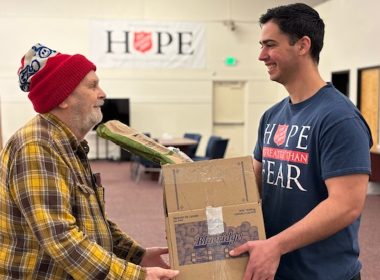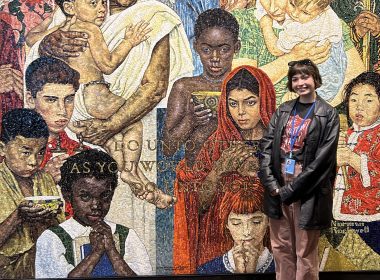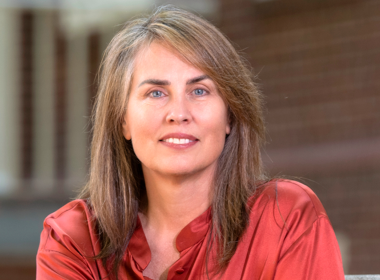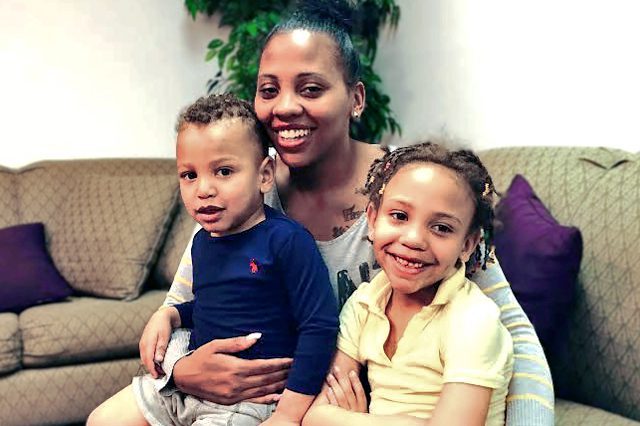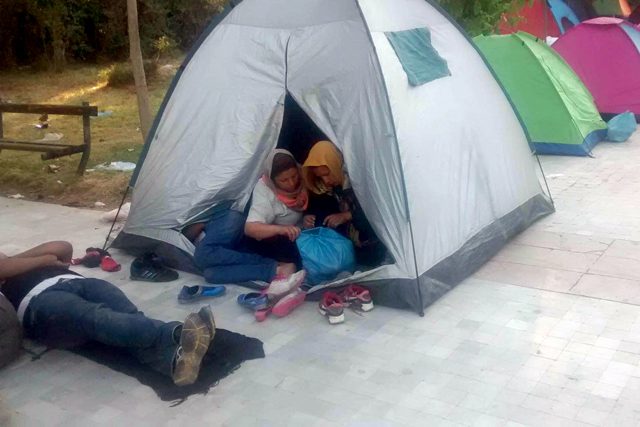Over half of new mothers are unmarried in our nation’s capital, a higher rate than any U.S. state.
By Jared McKiernan –
Ask Feather Butler and she’ll tell you—being a single mother is a lot of work.
As we talk in the lobby of The Salvation Army Turning Point transitional housing facility in Washington, D.C., Heaven, 6, and Hayden, 2, can’t seem to sit still.
“Mommy! Mommy! Mama!” Hayden shouts, lapping the coffee table, his sister racing up and down the halls.
“Shhh!” their mother pleads.
They mellow out, and she opens up.
“My father was murdered when I was little,” said Butler, 25. “Once I graduated from high school, I was just focused on getting all of that anger out, but I wasn’t getting it out in a positive way.”
It started with drinking, clubbing and one-night stands. After having two children, she lost her restaurant job, car and apartment. Then, her children’s father went to jail.
[ezcol_1third
[ezcol_end_right]
– The number of children living in single-parent homes has nearly doubled since 1960.
– One-third of American children are being raised without a father.
– Poverty reaches 45 percent of children who live without a father.
SOURCE: U.S. Census Bureau. [/ezcol_1third]
And suddenly, she had two small kids, no source of income and no place to live.
“Sometimes, it’s just…” she paused, “a lot, doing everything by yourself.”
Stories like Butler’s are emerging. Over 6 in 10 women who give birth in their early 20s are unmarried, and nearly a third of households headed by single women live below the poverty line, according to U.S. Census data.
Worse yet, poverty reaches 45 percent of children who live without a father. It’s especially bad in D.C., where over half of new mothers are unmarried—more than any state in the nation.
According to census demographers, single motherhood has steadily risen since the 1940s but surged in recent years due in part to changing norms for sexual behavior and a decline in marriage rates.
High numbers of unwed mothers are also correlated to low levels of education. Almost half of new mothers with only a high school diploma are unmarried, compared with less than 9 percent of those with a bachelor’s degree or higher.
Today, one-third of American children—a total of 15 million—are being raised without a father. Vincent DiCaro, vice president of the National Fatherhood Initiative, is bullish on strengthening the nuclear family. He says address the issue of fatherless homes, and the rest will correct itself.
In the meantime, many single mothers are left applying for a patchwork of government assistance, including the Supplemental Nutrition Assistance Program (SNAP), Temporary Assistance for Needy Families (TANF), and child care subsidies. Butler, like many, had trouble getting by on just those.
At Turning Point, D.C. single mothers ages 18-30 can enter a two-year transitional housing program equipped with 28 units to work toward stable employment and self-sufficiency. Residents gain access to case management and counseling services, plus classes in budgeting, parenting, and housekeeping as well as employment searches to help them secure a brighter future.
The program utilizes three core components: “parenting, codependency, and out of poverty,” according to Elgie A. Labbe’ Jr., the program’s interim director and independent living skills coordinator. He arrived in 2000, when Turning Point opened at its current site in D.C.’s Columbia Heights neighborhood. Then, only three families lived on site. Turning Point’s staff has since begun recruiting 10-12 families twice a year to meet the increase in demand for services.
“Some things that people learn in their normal family history, some of our mothers for whatever reason, that process has been delayed,” said Labbe’, who doubles as a pastor at a local church. “A lot of them know it and a lot of them want to get back on track, but being a single parent with two or three [young] kids brings a different set of challenges.”
Among them: child care and finding employment. Staff members work with the mothers through four phases to help them stay in school or employed and to make decisions about their future. The mothers in the program, meanwhile, build a group support system as their families move together through the program. After residents exit the program, caseworkers check in on their progress at three months, six months, and one year, in addition to holding alumni events.
Turning Point case managers often stress to clients the value in looking beyond the physical boundaries of D.C. for resources and opportunities, because according to Labbe’, the amount of low-income housing in the district stagnated long ago.
“D.C. is one of those towns where everyone thinks because it’s the nation’s capital that there are more resources here than everywhere else. Believe me—there aren’t,” Labbe’ said with a laugh. “That’s just folks’ perception. So they gravitate to urban areas where they believe that there are more resources, more housing, more things like that, and they just add to the pool of people who are looking for things that there just aren’t enough of.”
Historically, D.C. has had a high incidence of unwed parenthood and teen pregnancy. Labbe’ said that while these numbers have decreased in the past decade, they haven’t fallen enough to where “the system can still absorb and provide services for everyone who has a need.”
This, Labbe’ said, underscores the importance of a stable source of income.
“One [resident] left, at about 21 months [into the program], within the last six months and she got a job as a security officer at an apartment complex and then was able to get an apartment in the apartment complex where she works as a security guard.”
It’s these types of victories that make it worth it for him.
“The work is very fulfilling and you get a chance to see folks changing right before your eyes, sometimes slowly and gradually sometimes the lightbulb comes on and they start getting busy,” he said. “They want to catch up, they want to start moving.”
Resident Charnika Slye will finish the program in February 2016. She said that while adjusting to a curfew and some of the other regulations at Turning Point has been a challenge, she welcomes the structure.
“If you’re used to being out on your own you feel like you’re giving up some freedom,” Slye said. “But, it’s hard if you make it hard.” Slye has found her niche serving onsite at the facility’s Playtime program, a project to benefit children facing homelessness. Yet, she understand there’s work ahead.
“Education and helping others are my biggest goals,” she said.
Aside from the practical challenges of being a single mother, Butler said it’s difficult being taken seriously, especially while searching for employment.
“Getting respect is difficult,” she said. “A lot of people in the work world, they just don’t take you seriously if they know you have kids.”
Here at Turning Point, she said, that’s different.
“Everybody’s only interested in what they can do to advance you positively,” she said. “When I came here I was really stressed out and I would scream a lot, and no one was ever like ‘you’re a bad mom for doing that.’ They’d just say like, ‘well how about we try it this way.’
“I am so much more patient with them, the dependency, those things are really therapeutic,” she said. “Even thinking about those things reminds me of where I’ve been and how far I’ve come.”
Butler said she likes moving to each phase, because it keeps her accountable. When she arrived at Turning Point, she set her goals high—perhaps too high.
“My goals when I first came were like, ‘I want to buy a house,’” she laughed. So, she shifted her focus to a more attainable short-term goal.
“I wanted to pay off my student loans and all of my traffic tickets, and I paid them off,” she said, smiling.
She looks to build on that momentum.
“I’m really into fashion. And I know it’s really about your talent, but I really want to get a degree in fashion merchandising just because I have the talent—it’s there—but I feel like sometimes you have to prove it on paper.”


